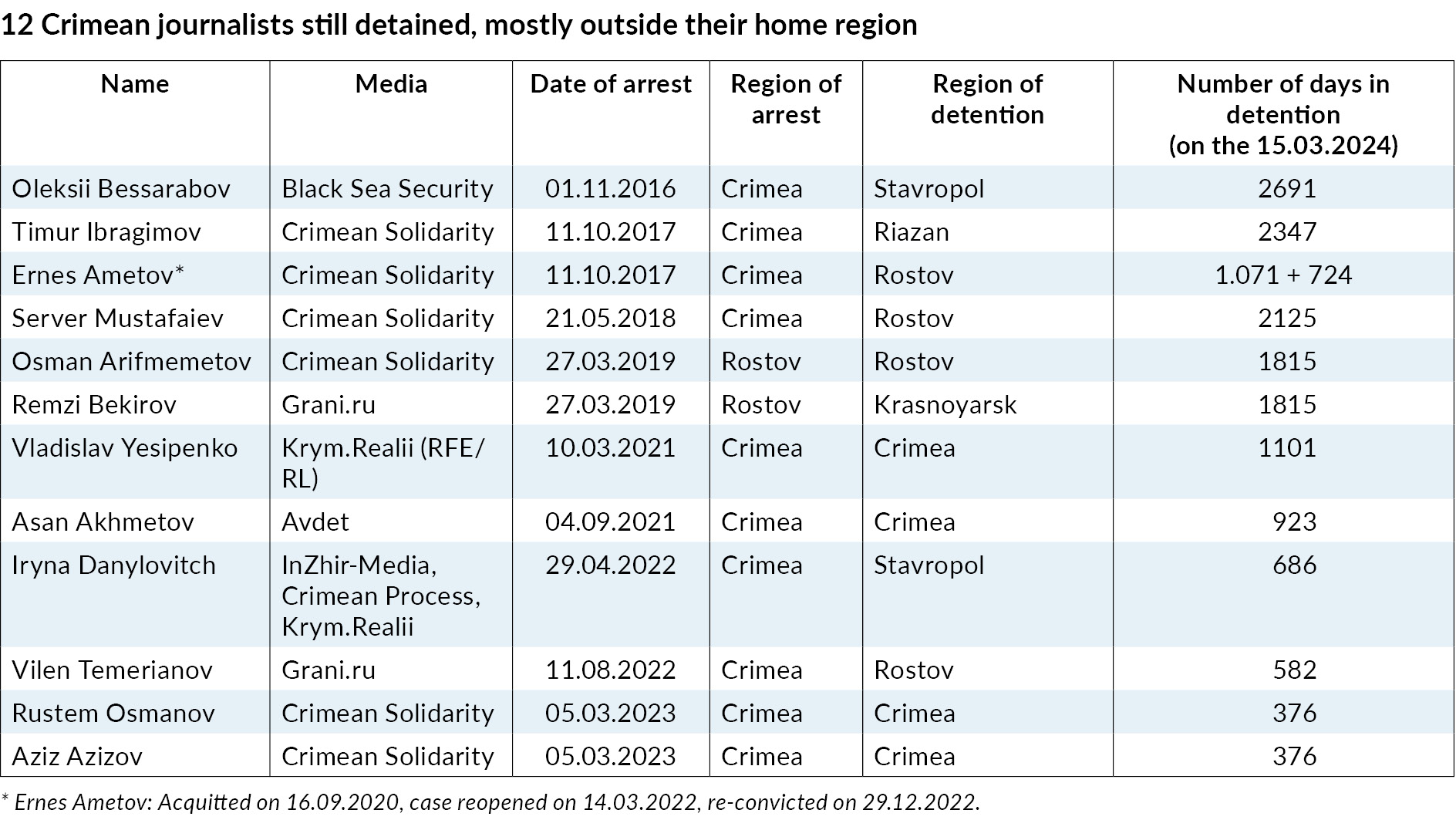The arrival of cars without licence plates at dawn is a bad sign in Ukraine’s occupied regions. So, when the occupation forces arrived on 22 February 2024 at the home of Lutfiye Zudiyeva, a freelance reporter for Crimean Solidarity, a local media outlet, and for Graty, a Ukrainian media specialising in court cases, her relatives immediately sounded the alarm. Zudiyeva’s equipment was seized during a search of her home and she was taken away for questioning at the “Centre for Combatting Extremism” in the nearby city of Dzhankoy, in north of Crimea, before being released a few hours later. Her arrest came just two days after the US magazine Newsweek published her article on life under Russian occupation in Crimea. It was not her first arrest.
What happened to Zudiyeva is typical of the climate of intimidation that the Russian authorities have imposed on independent journalists in Crimea. The crackdown on Crimea’s independent media began with the Russian invasion that the illegal referendum of 16 March 2014 endorsed and it intensified after Russia’s large-scale invasion of Ukraine on 24 February 2022, which prompted new arrests and more judicial harassment of media personnel in Crimea.
The Ukrainian human rights NGO ZMINA registered no fewer than 162 cases of media professionals being persecuted by the Russian authorities in Crimea in 2022 and 2023. According to RSF’s tally, Russia is currently holding 12 journalists from Crimea, most of whom were arrested before the full-scale Russian invasion in 2022. The peninsula has become a media desert for the past ten years, making access to news and information almost impossible. According to ZMINA, 88% of media outlets active before 2014 had ceased operating by 2015.
“Arrests, intimidation, media closures… For ten years, independent media in Crimea have been living through a real nightmare. Journalists have become prime targets for the Russian occupying forces, who silence all alternative voices. In 2014, the Kremlin began using Crimea as a laboratory for its methods of persecuting independent media in Ukraine, which it then extended to all occupied territories. We condemn what has been a dark decade for independent journalists in Crimea and we call on the international community to take action to obtain the release of all those who are unjustly detained.” (Jeanne Cavelier, Head of RSF’s Eastern Europe and Central Asia desk)
Russian judicial machine goes all out
On 10 March 2022, just two weeks after the full-scale Russian invasion, Remzi Bekirov, a local independent journalist working for the website Grani.ru who had been held since March 2019, was sentenced to 19 years in prison on a charge of “terrorism.” Less than two months later, in April 2022, Russian security agents covertly arrested Iryna Danilovych, a freelance reporter for InZhir-media, a local news site, for Crimean Process, which specialises in judicial cases, and for Krym.Realii, the local branch of the US broadcaster Radio Free Europe/Radio Liberty (RFE/RL). Convicted later in 2022 of “illegally manufacturing, transporting or possessing explosives,” she is now serving a seven-year sentence in a prison inside Russia where she is being denied access to medical care although in very poor health. Crimean Solidarity reporter Osman Arifmemetov was sentenced to 14 years in prison on a terrorism charge in Autumn 2022 after spending a long period in pre-trial detention.
Arbitrary arrests, mistreatment
Arrested on spurious “terrorism,” “espionage” or “sabotage” charges, local journalists have often been subjected to torture and mistreatment. This is the case with Vladislav Yesypenko, a Krym.Realii reporter who was arrested in 2021 for “espionage” and was given a six-year prison sentence the following year. It is also the case with Timur Ibragimov, a Crimean Solidarity journalist sentenced to 17 years in prison in 2020 for “terrorist activities” who has had health problems in prison that have received no medical attention.
In an attempt to speed the release of the 12 Crimean journalists and four media professionals from Ukraine currently held by Russia, several Ukrainian parliamentarians tabled a resolution last month calling on the international community to take up their cases.

Quelle: Reporters Without Borders, 15.03.2024, https://rsf.org/en/ten-years-russian-occupation-crimea-decade-repression-local-independent-journalism.